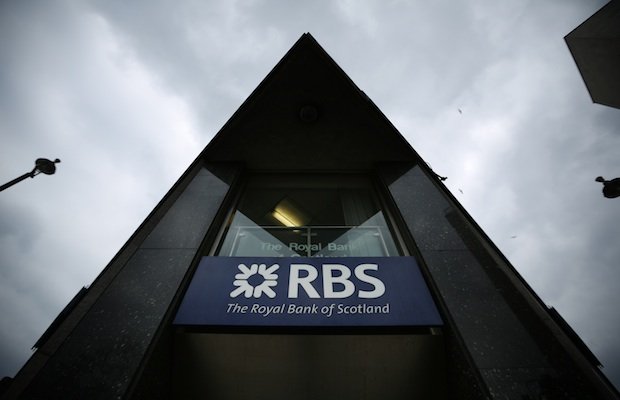RBS sheds over three per cent on £38bn bad bank announcement and sliding profits

The Royal Bank of Scotland was one of the FTSE's biggest faller this morning as it announced that it is to create an internal "bad bank" to manage £38bn of its riskiest assets by the end of this year, meaning it'll avoid addressing demands for a full split. (Release)
The lender also posted a third quarter pretax loss of £634m this morning, after a £496m accounting charge to improve its credit. This compares with a £1.4bn loss in the third quarter of 2012.

New chief executive Ross McEwan says, "the bar has been set at a higher level for RBS than for other UK banks because we were rescued at the public's expense."
The news follows the bank's suspension last night of two traders, in conjunction with an investigation into the potential manipulation of foreign exchange rates.
The group says it expects to report a significant loss this year.
Chancellor George Osborne, speaking on BBC Radio Four's Today programme, admitted that beginning the process of returning RBS to private ownership is "unlikely" to happen before the next general election. He added that he would preference selling RBS shares, rather than giving them to taxpayers.
Shadow Chancellor Ed Balls has responded to Osborne's comments, saying "the taxpayer interest must come first". He adds that watered down reforms should be watched closely – for example, Osborne's "refusal to implement the Parliamentary Commission’s call for a backstop power that would allow for full separation of all the banks, not just one or two", in the event that ring-fencing proves ineffective.
PPI and profit
RBS was hit by another £250m PPI charge in the period, as well as £99m in unspecified "regulatory provisions".
Group operating profit was £438m in the third quarter, compared to £931m in the last quarter, and £586m in the third quarter of 2012 which, says RBS, reflects exit and restricting costs.
Total revenues stood at £4.9bn, down from £5.6bn for the same period last year.
Core operating profit for the third quarter was £1,283m – six per cent up on the previous quarter and driven by ongoing reductions in impairment losses in Retail and Commercial and an improvement in Markets operating profit. But the figure was down 14 per cent like-for-like, pushed by the continued strategic contraction of the Markets business.
Bad bank
Running down assets in a bad bank will, says RBS, cost £4-4.5bn in the fourth quarter, but these costs will be neutralised. The aim is to get rid of 55-70 per cent of these assets over the next two years, with all of them being removed from the balance sheet over the next three.
McEwan says, "a balance sheet clean-up does not make a great bank on its own… for the most part our improved profitability is driven by a fall in impairments rather than an increase in income. Revenue growth in our main business franchise – UK Retail and Commercial – is not what we would like it to be at this point in our recovery. I'm encouraged that costs are down 8 per cent on last year, but they are still unsustainably high. We must do better and we can do better."
Joe Rundle of ETX Capital:
The “bad bank” is long overdue and also questionable as some felt that it would be better to just separate RBS into a good bank/bad bank structure. It seems as if RBS and the UK government have not been able to completely quantify the toxic assets on the balance sheet which is perhaps why the bad bank wasn’t spun off separately.
Today’s move looks to be a clever PR strategy so RBS can distinguish the performance of the good bank from the bad bank – this will help restore confidence in the UK bank and also help pave the way for privatisation.
RBS intends a full review to improve customer service, which it'll report on in February of next year.